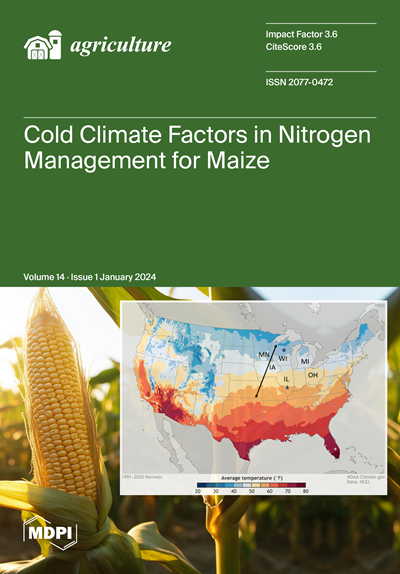叶面喷施后小麦叶片对锌的吸收及其向籽粒的转运
IF 3.6
2区 农林科学
Q1 AGRONOMY
引用次数: 0
摘要
农艺生物强化可能是克服小麦锌缺乏症的一种有前景的策略。然而,当涉及到锌的吸收和积累的相对效率时,品种对叶面施用的反应是神秘的。为了解释这种神秘的反应,本研究的目的是(i)跟踪叶片施用后通过叶片吸收锌的量,(ii)计算实际转运和储存在籽粒中的吸收锌的量,(iii)计算高产品种在锌吸收和转运方面的相对效率。结果表明:叶片吸收锌的比例为0.90%,吸收锌的比例为43%;不同品种对锌的吸收(0.71 ~ 1.07%)和随后的锌转运(23 ~ 66%)差异显著。叶片锌处理还提高了叶片面积、高度、穗粒数、穗粒数、产量、叶片和籽粒锌含量以及籽粒蛋白质含量等生长性状。这些发现表明,在设计生物强化育种策略时,需要谨慎地选择亲本。本文章由计算机程序翻译,如有差异,请以英文原文为准。
Zinc Absorption through Leaves and Subsequent Translocation to the Grains of Bread Wheat after Foliar Spray
Agronomic biofortification could possibly be a promising strategy to overcome zinc (Zn) deficiency in wheat; however, the cultivar’s response to foliar applications is enigmatic when it comes to the relative efficiency of Zn absorption and accumulation. To decipher that enigmatic response, this study was designed with the objectives (i) to track the amount of Zn absorbed through leaves after foliar application, (ii) to calculate the amount of the absorbed Zn actually translocated and stored in the grains, and (iii) to calculate the relative efficiency of the high yielding cultivars in terms of their Zn absorption and translocation. The results reveal that 0.90% of the zinc sprayed was absorbed through leaves, and 43% of the absorbed Zn was translocated to the grains. The cultivars significantly varied for their Zn absorption (0.71–1.07%) and subsequent translocation of the absorbed Zn (23–66%). Foliar zinc treatment also improved growth attributes such as leaf area, height, spikelet per spike, number of grains per spike, grain yield, leaf and grain Zn content, and grain protein content. These findings suggest a need for cautious parent selection in devising the breeding strategies intended for biofortification.
求助全文
通过发布文献求助,成功后即可免费获取论文全文。
去求助
来源期刊

Agriculture-Basel
Agricultural and Biological Sciences-Food Science
CiteScore
4.90
自引率
13.90%
发文量
1793
审稿时长
11 weeks
期刊介绍:
Agriculture (ISSN 2077-0472) is an international and cross-disciplinary scholarly and scientific open access journal on the science of cultivating the soil, growing, harvesting crops, and raising livestock. We will aim to look at production, processing, marketing and use of foods, fibers, plants and animals. The journal Agriculturewill publish reviews, regular research papers, communications and short notes, and there is no restriction on the length of the papers. Our aim is to encourage scientists to publish their experimental and theoretical research in as much detail as possible. Full experimental and/or methodical details must be provided for research articles.
 求助内容:
求助内容: 应助结果提醒方式:
应助结果提醒方式:


